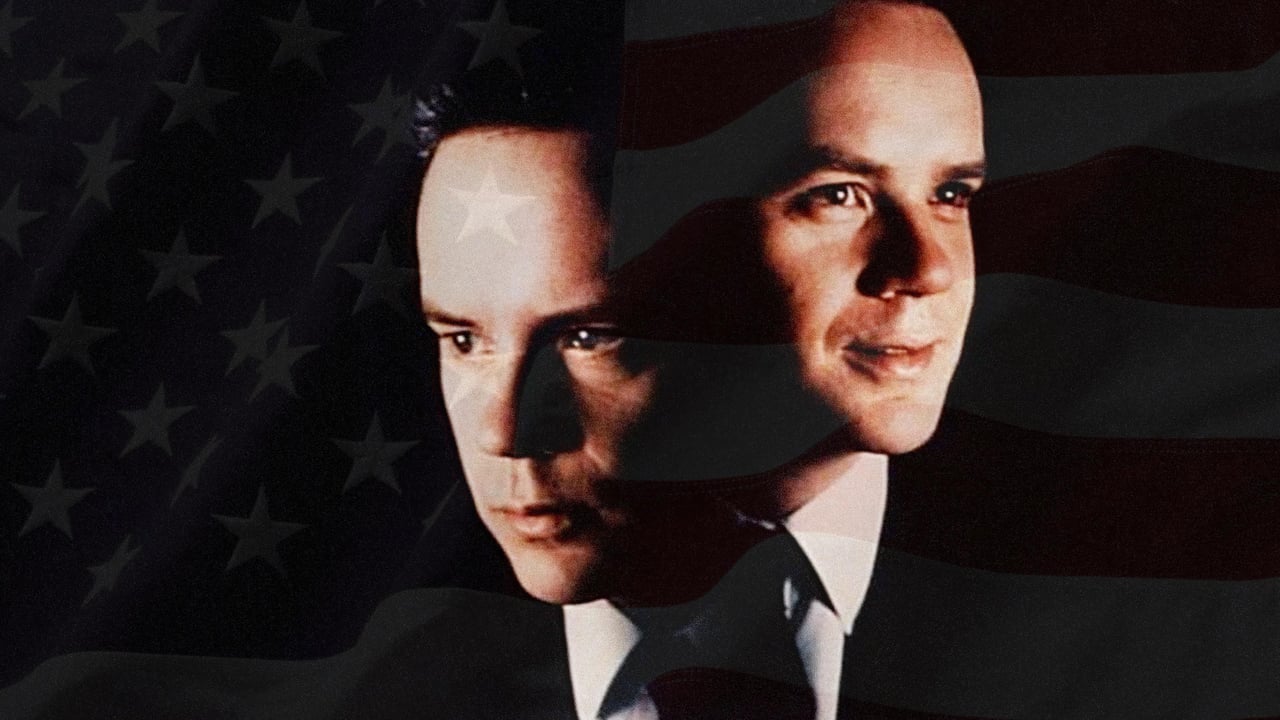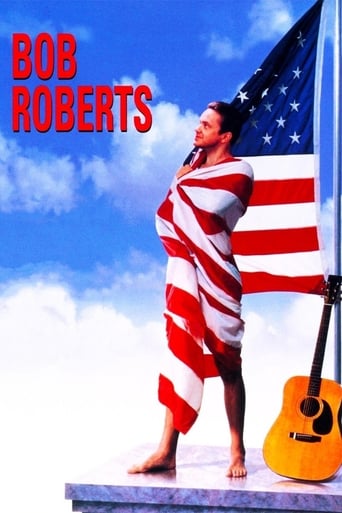ElMaruecan82
Half political satire and half mockumentary, "Bob Roberts" accurately reflects what is wrong with the American political system … and indirectly what is right. The film relates the ascension of a charismatic yuppie from Philadelphia, a 35-year old self-made, a gifted swordsman, guitar player and folk singer named Bob Roberts.Like the most memorable movie characters, Bob Roberts is a man of fascinating contradictions: his conservative views are swept off by his youth, handsomeness and communicative smile while his notorious aversion toward the 60's rebelliousness is expressed through folk songs performed in public à la Bob Dylan.It's not coincidental that the film is Tim Robbins' directorial debut, and that he wrote and starred in it, for it immediately echoes another political classic : "Citizen Kane". When you watch Bob Roberts, you don't have Charles Foster Kane in mind, but as he slowly sinks into the darkest side of his personality, the film gets more distant to its initial satirical tone, and become closer to a powerful character study, scary because true.The strength of "Bob Roberts" is its multi-layered directing, flirting so many tones and styles. The documentary format allows jumping from one scene to another, without caring for its disjointed aspect. We follow Roberts visiting a school, singing in public, being acclaimed by fans or criticized by a journalist, played by Lynne Thigpen. She provides the first interesting insight by calling Roberts a "Machiavellian poseur" even though at that moment, Roberts still strikes as a normal politician. Aren't they all Machiavellian poseurs anyway? But one character regularly pops us as the troublemaker: Giancarlo Espositio plays Bugs Alijah Raplin, a black journalist and activist who discovered the implications of Roberts' anti-drugs foundation with some third-world countries' traffic. Robert's right hand, Lukas Hart III, played by Alan Rickman, has been accused several times but no proof was found whatsoever. According to Raplin, one of the reasons the media doesn't treat the information is because they belong to politicians. Later, an incident during a live TV program proves him right. Bugs' insistence and undesirability inspires a cruel machination against him that will also help Roberts to leverage the number of voters. Bugs, as the attacker who'd turn to be a victim, is an interesting counterpart to the titular character's flamboyance, being everything he's not, he's not an upper class WASP, he doesn't have the same sex-appeal or charisma, he's marginalized by his quest of the truth. The contrast is too obvious though, and I guess the subtle portrayal of Senator Baiste by Gore Vidal, as Roberts' opponent.Vidal embodies the honesty of a politician born with true idealism, a man who has certainly been impacted by James Stewart in "Mr Smith Goes to Washington" and believed that John F. Kennedy would change America, before the disillusioning aftermath of his assassination. Like Bugs, Baiste is victim of a cruel machination accusing him of abusing an underage girl. He never truly recovers from the accusation in the polls, and as he doesn't believe in "negative campaigning", never strikes back.Baiste's interventions bring the most interesting insights about American politics, and I read in IMDb trivia that most of his statements were improvised, which provides a supplementary level of spontaneity and truth. Baiste is actually not surprised by Roberts' appeal. He knows the guy has connections with the CIA, which had proved to work for Nixon. The film is set at the verge of the first Gulf War, and since the beginning, despite the seemingly diplomatic efforts going on, we know the dice are cast.As the storyline progressed, I felt the film lost its realism, got too sensational, even too radical in its attempt to denounce some extreme wings of American policy. Roberts' fans got more and more demonic, forming a sort of collective trance where Roberts was less a political leader than a modern-day guru. They hear what they want to hear, they don't complain, all they want is to have the right to get their share of the American Dream, and from the mouth of a businessman, the share is not symbolical. Roberts doesn't speak about values, but about greed and success, incarnating a cynical detachment that even the crisis of 1987 hadn't defeated.But while I felt the film went too far after the assassination attempt on Roberts, I realized on a second thought that the film couldn't have been more accurate. Are the manipulations orchestrated by Robert's team unconceivable? Just think of Richard Nixon, think of the way George W. Bush attacked Iraq on the basis of false accusation. Yes, politics is made of lying, as Vidal said, it's all about justifying a threat by taking a local thug and waving its menace as a Hitler-like figure. The same manipulation of the Baiste scandal echoes the way, the Bush camp tried avoided the debate about his enlisting in the Vietnam war. History repeats itself. It's true that the portrayal of radicals flirt with caricature while the realism of movies like "JFK" and "Nixon" didn't make them less flattering about politicians."Bob Roberts" is refreshing because it points the finger on the danger of radical beliefs, and the way they lead to disasters, in the name of so-called values. And since I mentioned "Nixon" and "JFK", I realize that the 90's might be the best decade for political movies, Oliver Stone took the dramatic approach while "Bob Roberts" and "Wag the Dog", another gem of Black comedy, were more satirical but, at the end, more prophetic. Maybe it's due to the fact that the 90's were still close enough to the 70's, so the Nixon's trauma wasn't healed yet, and close enough to the 2000's, so people could foreshadow the fanatical path America was taking.The pedagogic aspect of "Bob Roberts" is undeniable, but it's its prophetic value that makes the whole experience chilling, behind the genuine laughs it generates.
stosthomas
Recently, I had a chance to re-visit this film after not seeing it for a while, and to me this film has acquired some new meaning since it was released back in the early 90's. Our country has seen quite a bit of political upheaval since the release of this film, and when you read the current headlines dealing with the new, extreme version of the Republican/Tea Party, you can't help but think that this film was far head of it's time in predicting the new wave of conservatives that we are currently seeing in this country. You could almost imagine Glenn Beck, Sean Hannity, Bill O'Reilly, Rush Limbaugh, as well as Sarah Palin, Michelle Bachmann, John Boehner, Eric Cantor, and all of the other extreme right/Teaparty personalities being in this film. When you look at Jack Black's character staring blankly into the camera while he and his brothers profess their love for Bob Roberts, you can almost transpose them into the faces of the current Teaparty Republicans. And the speech that Giancarlo Esposito's character Bugs Raplin gives towards the end of the film about how corporate media doesn't want to tell you the truth almost accurately predicts what we are seeing now with many media outlets being owned by corporations such as GE, Comcast, Time Warner and others who dilute the information we see every day on TV.For me, this film was perhaps more visionary than originally intended, and in future years might be looked at not as political satire, but as a very keen predictor of what has happened to our political process and the watering down of the corporate news media.
Brian Wright
Bob Roberts is a timely movie about national political cynicism that was intended to satirize the Republican Revolution of 1994. Others have contended the subject of the satire was the Reagan 80s, against the Gordon Gekko "Greed is Good" crowd. But it could not be more appropriate to the rise and ascendancy of the Bush II clique. Roberts, a Pennsylvania Senate candidate , is a rich, smarmy, guitar-strumming, media savvy corporate shill. He sings folk songs about the joys of strip mining, stock-market success, and capital punishment for drug dealers...For my complete review of this movie and for other movie and book reviews, please visit my site TheCoffeeCoaster.com.Brian Wright Copyright 2007

